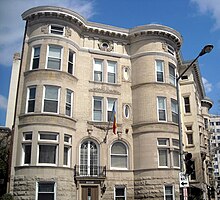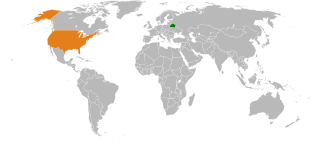
Interstate relations between the United States and Belarus began in 1991 upon the dissolution of the Soviet Union, of which Belarus had been a part. However, the relations have turned sour due to accusations by the United States that Belarus has been violating human rights. Belarus, in turn, has accused the United States of interfering in its internal affairs.

Ghana–United States relations are the diplomatic relations between Ghana and United States.
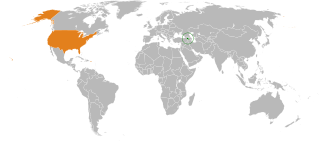
The dissolution of the Soviet Union in December 1991 brought an end to the Cold War and created an opportunity for establishing bilateral relations between the United States with Armenia and other post-Soviet states as they began a political and economic transformation. The United States recognized the independence of Armenia on 25 December 1991, and opened an embassy in Armenia's capital Yerevan in February 1992.

U.S.–Uzbekistan relations formally began when the United States recognized the independence of Uzbekistan on December 25, 1991, and opened an embassy in Tashkent in March 1992. U.S.-Uzbekistan relations developed slowly and reached a peak following the U.S. decision to invade Afghanistan following the September 11, 2001 attacks. Relations cooled significantly following the "color revolutions" in the former Soviet republics of Georgia, Ukraine, and Kyrgyzstan in 2003–2005, and the Government of Uzbekistan sought to limit the influence of U.S. and other foreign non-governmental organizations (NGOs) working on civil society, political reform, and human rights inside the country.
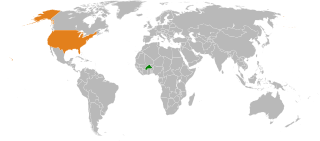
Relations between Burkina Faso and the United States are good but has been subject to strains in the past because of the Compaoré government's past involvement in arms trading and other sanctions-breaking activity.
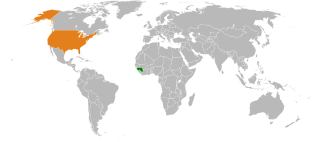
Guinea – United States relations are bilateral relations between Guinea and the United States.

According to the 2012 U.S. Global Leadership Report, 38% of Hungarians approve of U.S. leadership, with 20% disapproving and 42% uncertain, a decrease from 53% approval in 2011. According to a 2018 poll, 68% of Hungarians view the United States favorably.

Kyrgyzstan – United States relations are bilateral relations between Kyrgyzstan and the United States.

The United States established diplomatic relations with Latvia on July 28, 1922. The U.S. Legation in Riga was officially established on November 13, 1922, and served as the headquarters for U.S. representation in the Baltics during the interwar era. The Soviet invasion forced the closure of the legation on September 5, 1940, but Latvian representation in the United States has continued uninterrupted for 85 years. The United States never recognized the forcible incorporation of Latvia into the U.S.S.R. and views the present government of Latvia as a legal continuation of the interwar republic.

Lesotho–United States relations are bilateral relations between the Kingdom of Lesotho and the United States of America.

Lithuania is one of the most pro-United States nations in Europe and the world, with 73% of Lithuanians viewing the U.S. positively in 2011. According to the 2012 U.S. Global Leadership Report, 48% of Lithuanians approve of U.S. leadership, with 20% disapproving and 32% uncertain.

The United States and North Macedonia enjoy excellent bilateral relations.
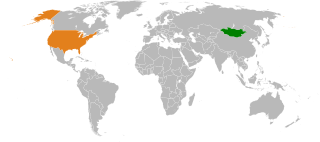
Mongolia–United States relations are bilateral relations between the United States and Mongolia.
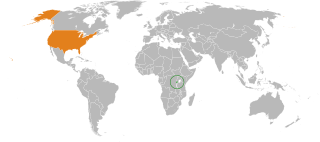
Rwanda–United States relations are bilateral relations between Rwanda and the United States.

Tajikistan–United States relations are bilateral relations between Tajikistan and the United States that began in 1992.

Tunisia – United States relations are bilateral relations between Tunisia and the United States.

Austrian-Moldovan relations are foreign relations between Austria and Moldova. Both countries established the diplomatic relations on 25 March 1992. Austria is represented in Moldova through its embassy in Bucharest (Romania) and through an honorary consulate in Chişinău. Moldova has an embassy in Vienna and an honorary consulate in Innsbruck. Austria supports Moldova's European Union membership.

Moldova–Switzerland relations are the bilateral relations between Moldova and Switzerland. Both countries established diplomatic relations on September 2, 1992. Moldova is represented in Switzerland through its embassy to the United Nations in Geneva. Switzerland is represented in Moldova through its embassy in Kyiv (Ukraine) and an honorary consulate in Chişinău. Since 1992 various senior Moldovan officials have visited Switzerland to discuss improvements in bilateral relations. Switzerland has provided significant aid to Moldova. Both nations are members of the Council of Europe.

Kent Doyle Logsdon is an American diplomat who has served as the U.S. ambassador to Moldova since February 2022. He previously served as the U.S. chargé d'affaires for Germany.


